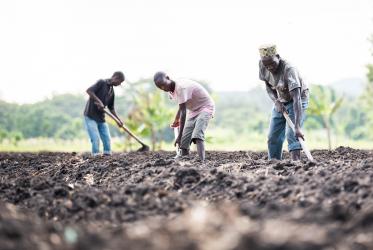As the El Nino weather pattern challenges southern Africa, what is the role of churches in helping people realize their right to food and livelihood?
Twenty-five people from churches and faith-based organizations in southern Africa asked this question as they gathered in Johannesburg on 18 April for a consultation entitled “Food, faith and El Nino.” Offered by the World Council of Churches Ecumenical Advocacy Alliance (WCC-EAA) in collaboration with World Vision International, the consultation was opened by Bishop Malusi Mpumlwana, acting general secretary of the South African Council of Churches.
He outlined the responsibility of churches and church-related organizations to respond swiftly and adequately in a well-coordinated manner to the unfolding crisis caused by the El Niño weather pattern. “We are contributing to climate change and the El Niño weather pattern is making matters worse. We can do much better in responding to this crisis: to accompany and to assist our communities in this critical period,” he said. “We need to be inspired by those who are responding, learn from each other and work together to help our communities tide over these critical times.”
WCC advocates for food security
Although food security is not given prominence as a climate change issue in the Paris agreement on climate change, the WCC-EAA has been calling for food security to be placed in the centre of climate change response actions.
The Paris agreement will be signed by more than 150 countries at a United Nations ceremony in New York on Earth Day, or 22 April. The agreement is a step in the right direction toward food security, said representatives from the WCC-EAA, because it offers a continued opportunity to advocate for just and sustainable food systems. The WCC-EAA has long advocated for agro-ecology, which means challenging commercial farming methods that are unsustainable for people and the planet’s health.
During the consultation, participants deepened their understanding of El Niño implications for food security and exchanged ideas for responses from the faith community.
Barbara Kalima-Phiri, senior regional advisor for Advocacy and Justice for Children (World Vision Southern Africa Region) elaborated on the current situation and the urgent measures needed. It is unacceptable that not all the countries in the region have acknowledged the crisis, she said.
Angeline Munzara, strategy group member of the Food for Life Campaign of the WCC-EAA and policy and advocacy director of Resilience and Livelihoods at World Vision International, agreed, saying: “The faith community is not only mandated to respond to the crisis, but we need to hold governments accountable, to take this situation seriously.”
Mervyn Abrahams, director of the Pietermaritzburg Agency for Community Social Action (PACSA), a long-standing participating organization of the WCC-EAA, presented data and trends from PACSA’s “Food Price Barometer” project. This highlighted South Africa’s shocking income inequality and the implication for rising food prices.
(The project was featured on Carte Blanche, an investigative journalism television programme. Watch the story here: http://carteblanche.dstv.com/player/1029084/)
“We cannot submit to the tyranny of averages, where the small proportion of very high-income citizens in the country masks the real poverty and undernutrition that most in the country suffers from,” Mervyn reminded.
The effects of El Nino
The current 2015–16 El Niño weather phenomenon is notable in terms of its strength and also its negative impact on crop production, livestock and agricultural livelihoods worldwide. In southern Africa, an estimated 28 million people are food insecure, with Lesotho, Malawi, Swaziland and Zimbabwe declaring national drought emergencies.
In South Africa, it is estimated that poorer households already spend 55-75% of their total income on food. Food prices are estimated to rise by 30% during this year. Across the region, agriculture is mostly rain-fed and the severe drought is putting pressure on producers and consumers alike. Governments are responding to the emergency without adequate policies enabling adaptation and mitigation.
Related links:







